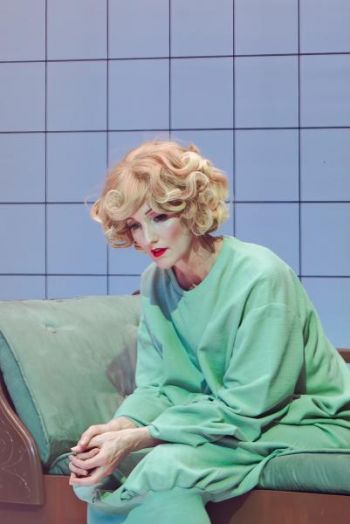Batshit
One of Leah Shelton’s great strengths is in the creation of subversive, disturbing images. Here the show begins with Shelton as the cliché blonde party girl in a flouncy cocktail frock but constrained by white bands of leather wrapped around her – one band jams her mouth, like a gag – impeding her movements and her speech. The import of this is clear. It’s the image on the poster for the show – an image that maybe attracted at least some of the audience.
Later, the frock is accessorised with an axe...
Lizzie Borden took an axe...
There’s a strange floppy coverall, which looks vaguely institutional but isn’t – and then we notice that one arm is extended way beyond nature and there are strange, funny but awful movements inside the body, searching for a roaming uterus...

Batshit is a multi-media, high tech agit-prop show that is a powerful shout of outrage and then a quiet plea for empathy and understanding. Its subject is female ‘madness’ – or rather the misapprehension or misdiagnosis of ‘madness’ going back to that old favourite ‘hysteria’ – the explanation for which was and still is truly ridiculous. I.e. that roaming uterus.
Shelton mocks the concept but shows us the continuation of other unfounded diagnoses without context, quick and easy means of labelling aberrant – that is different or inconvenient - behaviour and putting the difficult woman or ‘patient’ back in the box.
One very revealing segment of this uncomfortable but witty show sets up a ponderously dogmatic psychiatrist – black and white, on a television screen - pronouncing on the symptoms of schizophrenia. His words are projected on a huge screen. Shelton, in a white medical coat, roams the audience with a microphone, asking banal questions of audience members. They, embarrassed perhaps, give equally banal answers – enabling the on-screen shrink to pronounce a confident diagnosis of schizophrenia. The audience gets it - and there’s that brief laugh of realisation, of understanding. How easy it is.
But there is a powerful narrative thread here: the story of Shelton’s grandmother Gwen – a farmer’s wife incarcerated in a mental hospital, drugged and subject to horrifyingly repeated doses of ECT – until she becomes ‘quiet’ – which means pliable and accepting of her lot. It is this narrative that clinches the message of the piece; it affects the audience visibly, perhaps because it is personal and true (Shelton projects Gwen’s medical records and photographs).
The disparate elements of this show might have made up a patchy assembly of sketches – however clever - but it is this narrative that holds Batshit together into a whole. Shelton has a point to make. Perhaps she makes it too insistently so that we start to feel ‘Leah, we get it’, but in the end we are moved, especially when Gwen takes her place in a very long list of difficult (for some people) women that rolls down the big screen. Judy Garland, Julia Gillard, Princess Diana, Britney Spears...
Michael Brindley
Photographer: Jackie Dixon
Subscribe to our E-Newsletter, buy our latest print edition or find a Performing Arts book at Book Nook.

